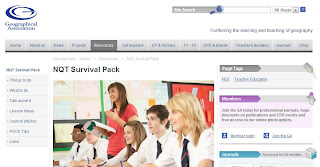Just caught up with the p
ublication of a piece by Professor David Lambert in the TES, published on the 27th of August, while I was away on holiday. I saw the original piece, and haven't checked yet for any possible editing of the piece for publication. It was titled
"Crack curriculum's core and open a world of opportunity"
If politicians want more focus on knowledge, subject teachers should decide what is crucial
The Government appears determined to reform the school curriculum again. This is something that some teachers may resist - it will appear as yet more change, when not enough time has been allowed for the last alterations to settle. And because of the return to "knowledge" as opposed to "skills", changes could be accompanied by much Gradgrind-sounding rhetoric about facts and old-fashioned subjects.
It could sound like a rush to restore a golden age of subjects past, and undo the curriculum reforms of the last government. However, if we can just stop dodging the imagined swinging pendulum for one minute, perhaps we can see a more progressive future, which is in teachers' hands. Teachers should seize this chance to get stuck into the knowledge question rather than collectively avoid it, which has in some ways been the story of recent times.
The professional language invented over the past 10 years is the language of pedagogy. This is no bad thing in itself, of course, but pedagogy has become so dominant that it is now confused with its apparently weaker cousin: curriculum. But it is the curriculum that teachers need to engage with.
At present, the subject curriculum is often referred to as the vehicle to "deliver" transferrable skills. This is wrong. It is pedagogy - the skills of doing and thinking - that is the vehicle. The curriculum is about the destination, the aims and goals, and is therefore a matter of serious moral deliberation.
Skills, on the other hand, are said to be value-free. But what shall we teach and how do we justify this? These are the important questions and they ought to be informed by what we think young people need to know.
The curriculum, like pedagogy, is about choices. It is, therefore, a part of what we have come to know as "professional judgment".
In the case of curriculum, the choices concern the selections of knowledge we try to teach. We make these selections according to principles we value, governed by our sense of educational purpose.
A curriculum shaped by whim, the topics in the news and contemporary themes of "relevance" - or, worse still, policy imperatives laid down by the Government - is likely to be incoherent, shallow and like junk food: deeply unsatisfying after the initial fat and sugar rush.
So this is why the subject disciplines matter. Geography is a good case in point. It is an ancient human fascination: its big idea is to try to make sense of ourselves at home on planet Earth. Mapping the world was, and is, fundamental. Today the project is augmented by all kinds of technologies including geographical information systems. But it is useful to consider for one moment what it means to know a bit of geography.
This is particularly important because these days, thanks to the internet and Google Earth, sat-nav and mobile phones, everyone knows some geography. Furthermore, we all have a geographical existence: we live somewhere, shop somewhere and have relatives and friends dotted around the globe.
This realisation has encouraged a lot of interest in "everyday geographies" - but again, let us pause for thought. Is our interest in everyday geographies curriculum-based or is it more a matter of pedagogy? Every teacher knows the strengths of working from the known and what is familiar to children - this is sound pedagogy. But in curriculum terms it is a betrayal not to move to the unknown and unfamiliar. Curriculum goals must be in the driving seat.
Part of the unknown for most young people consists of what is sometimes called "core knowledge", a component of our cultural literacy. This includes locational knowledge - also known as geographical facts, or what the Geographical Association's manifesto refers to as the subject's "vocabulary".
It is important to embrace this in school because this knowledge is not easily developed in everyday life. And yet, it is knowledge that helps make sense of information encountered in everyday life. It helps us function in society. If there is a move to identify subject essentials, or core knowledge, let us engage with it at face value. Instead of shrinking from the curriculum debate, it is time for teachers to take back intellectual responsibility for their work.
HOW DOES 'CORE KNOWLEDGE' FIT IN GEOGRAPHY?
The good news is that absolutely necessary core knowledge is not a large component of the geography curriculum. It can be taught via the regular use of atlases, occasional quizzes and other enjoyable and simple devices that form part of the repertoire of careful teaching.
It can be thought of as the extensive knowledge base upon which more intensive geographical case studies and inquiries can acquire deeper contextual meaning. To illustrate: can we really expect to be able to engage with global climate change meaningfully, without a mental framework that would include naming the oceans and some of the world's ocean currents? Without such knowledge, we are literally disabled to some degree.
We can incorporate it, as many careful geography teachers already do, into the broader geography curriculum. Geographical vocabulary is powerful, but so, too, is its grammar or syntax captured by its key ideas such as place, space and environment.
A person growing up in the 21st century as a global citizen (and all that implies) is at a disadvantage without geographical knowledge - economically, culturally and politically. How can we make any of the personal decisions that already confront us every day about energy, food and water security without geographical knowledge?
Understanding geographical perspectives contributes to our capabilities as educated individuals and members of society.
Professor David Lambert, Chief executive of the Geographical Association







